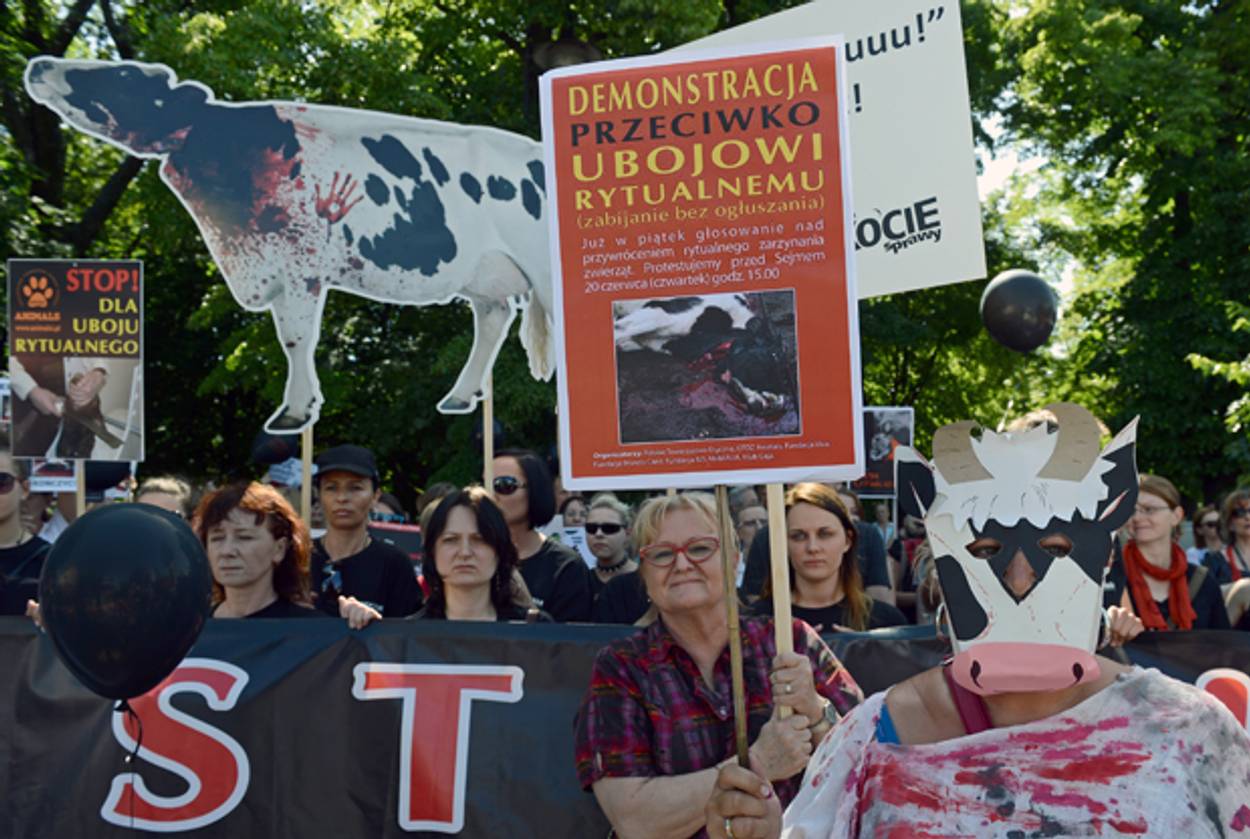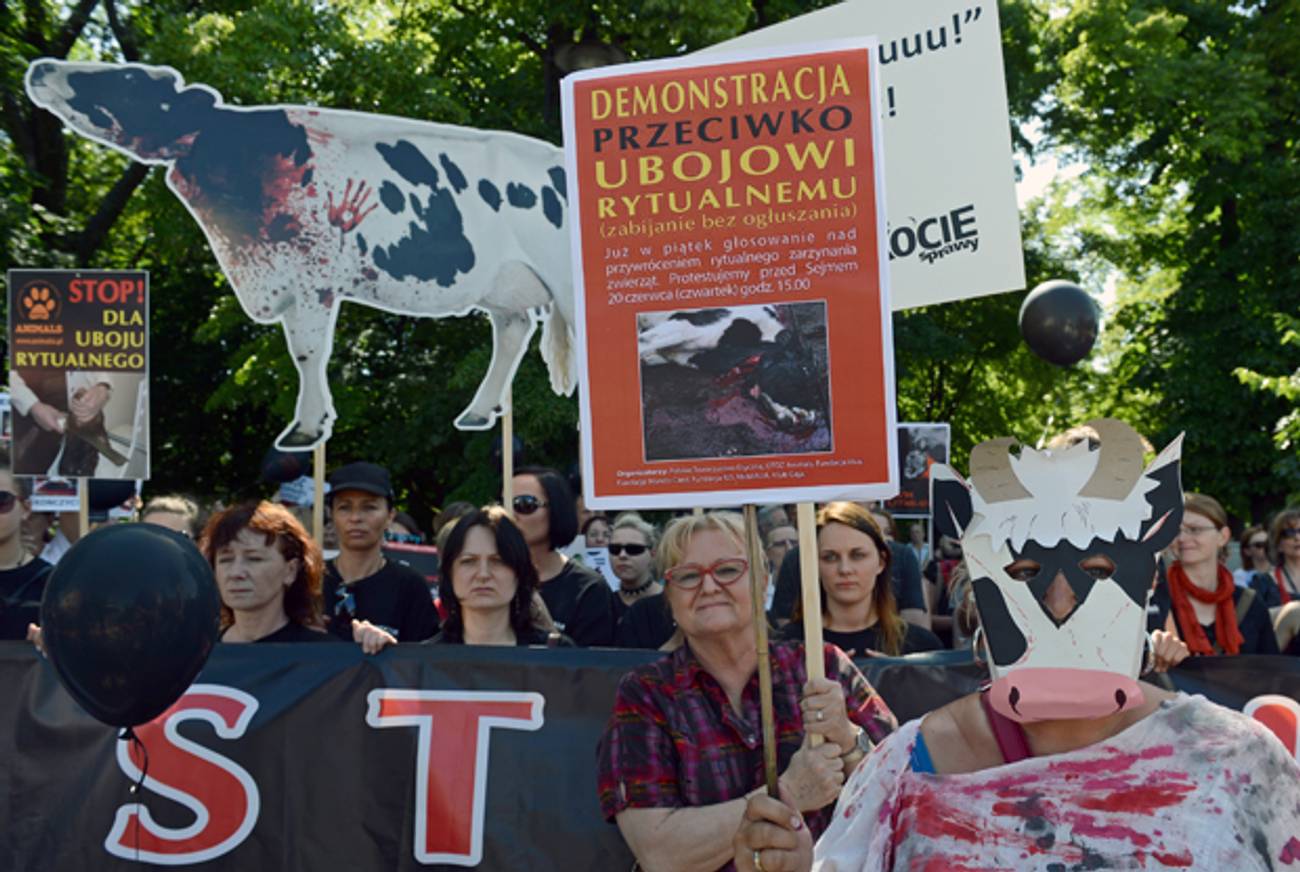Poland’s Chief Rabbi May Resign Over Kosher Slaughter Ban
What the controversial ban means for Poland’s Jewish community




Last Friday, the Polish parliament voted 222 to 178 to maintain the country’s ban on ritual slaughter, which was instated in January to ostensibly champion the rights of livestock. But the measure also effectively restricts the religious freedom of Jews and Muslims in a country that is overwhelmingly Catholic and often perceived abroad as anti-Semitic and xenophobic. In fact, the ban eerily recalls the fiercely anti-Semitic climate of the country’s interwar period, when, in 1936, the Polish parliament banned ritual slaughter alongside many other anti-Jewish decrees, such as limits on how many Jews could enroll at universities.
When news broke that ritual slaughter had been banned in Poland, Jewish organizations all over the world—from the Anti-Defamation League to the World Jewish Congress—protested, dismissing the ban as purely anti-Semitic. “It was an easy target,” Poland’s Chief Rabbi Michael Schudrich told me. He and Piotr Kadlcik, president of the Union of Jewish Communities of Poland, submitted an official statement to the Polish press. “It is therefore difficult not to see, in the decision of the Polish Sejm, the sinister hypocrisy which usually masks the discrimination against a part of the citizenry,” the statement read. “The majority, whose rights remain intact, should nonetheless be aware that the violation of minority rights usually bodes ill to those of the others.” Oddly enough, Polish TVN24’s website published the letter next a photo of a pig farm—a major part of the meat industry in Poland, and one that definitely won’t be stymied by the ban.
Yesterday, Schudrich remarked on Polish Radio ZET that he may resign over the ban, which he said would make him unable to serve the Jewish community. “I do not see the possibility to remain rabbi here in the face of laws that make it impossible for me to do my job,” Schudrich told me today. “How can I stay and serve my people?”
Such a move would be devastating for Poland’s fledgling Jewish community, which only began to flourish in the past two decades—largely thanks to leaders such as Schudrich, a native New Yorker who has held his post since 2004. Jonathan Ornstein, the director of Krakow’s Jewish Community Center, was also furious when he learned of the ban—and not because he’ll likely have to pay more for a proper Kosher roast (he’s a vegetarian). “It’s the first time in the 11 years I’ve been living here that I feel like a step backwards has been taken,” he told me.
“The people responsible for the ban are either ill-informed, stupid, or anti-Semitic—or a combination of the three,” Ornstein said. “In my experience, Poles are neither stupid nor anti-Semitic so this unfortunate situation is most likely the result of people being ill-informed or misinformed about what shechita is.”
The latest move to ban shechita (Hebrew for “ritual slaughter”) was not spearheaded by Poland’s notorious anti-Semitic ethno-nationalist groups, but instead found its support among the left-wing and animal rights activists—groups largely seen as “philosemitic” in Poland. Some of the ban’s biggest and most vocal supporters included Magdalena Sroda, an ethics professor at the University of Warsaw who is known best for her work on feminist and LGBT rights, and Anna Grodzka, the first openly transgender member of parliament. Alongside the Polish animal rights group Viva and the country’s left-liberal Palikot Movement, both women advocated for the ban based on issues of animal rights. According to both proponents and opponents of the ban, Poland’s kosher and halal meat industry had been a steadily growing business, employing 6,000 people and bringing in upwards of $650 million in exports to mostly Muslim countries, according to Polish Meat, an industry interest group. Still, kosher and halal meat accounts for less than 30 percent of Poland’s entire meat industry. Of the thousands of slaughterhouses in Poland, only 20 specialized in the production of kosher and halal meat, according the country’s agriculture ministry.
At stake here was the issue of whether or not the animals were being stunned before slaughter, which is prohibited by shechita, but required by Polish law (even though Poles widely slaughter carp without stunning for herring during the Christmas season). For that reason, proponents of the ban argued that the kosher practice of slaughtering animals, which had been protected by Polish law until January, was cruel and unusual and should therefore be outlawed. Last year, a Polish court ruled that the exemption was indeed “unconstitutional.” Their perspective seems reasonable enough, until one considers the fact that the language of the ban guarantees that hunting is still very much alive and well in Poland, where a definitively larger number of hunters than Jews or Muslims reside.
Whatever good intentions the animal rights activists may have had, the most troubling fact is that they ignored the new law’s similarity to the unabashedly anti-Semitic one passed in 1936. According to a JTA report from February 11, 1936, “The proposed law would compel the stunning of animals before slaughter, which violates the Jewish orthodox code. It would impose jail sentences not exceeding three months and 3,000-zloty maximum fines for violation and would go into effect on January 1, 1937.”
Though Sroda, Grodzka, and Palikot did not respond to interview requests, Schudrich said that all involved were made aware of the law’s historical significance. He also said that they were informed that shechita was, in fact, intended to be a more humane method of slaughter. “We met with members of the Sejm and leaders of the political parties to explain the humane nature of shechita and the fundamental role it plays in Jewish life,” Schudrich said.
It seems, however, that their history lesson fell on deaf ears.
Denise Grollmus is a writer and Fulbright scholar currently living in Warsaw.